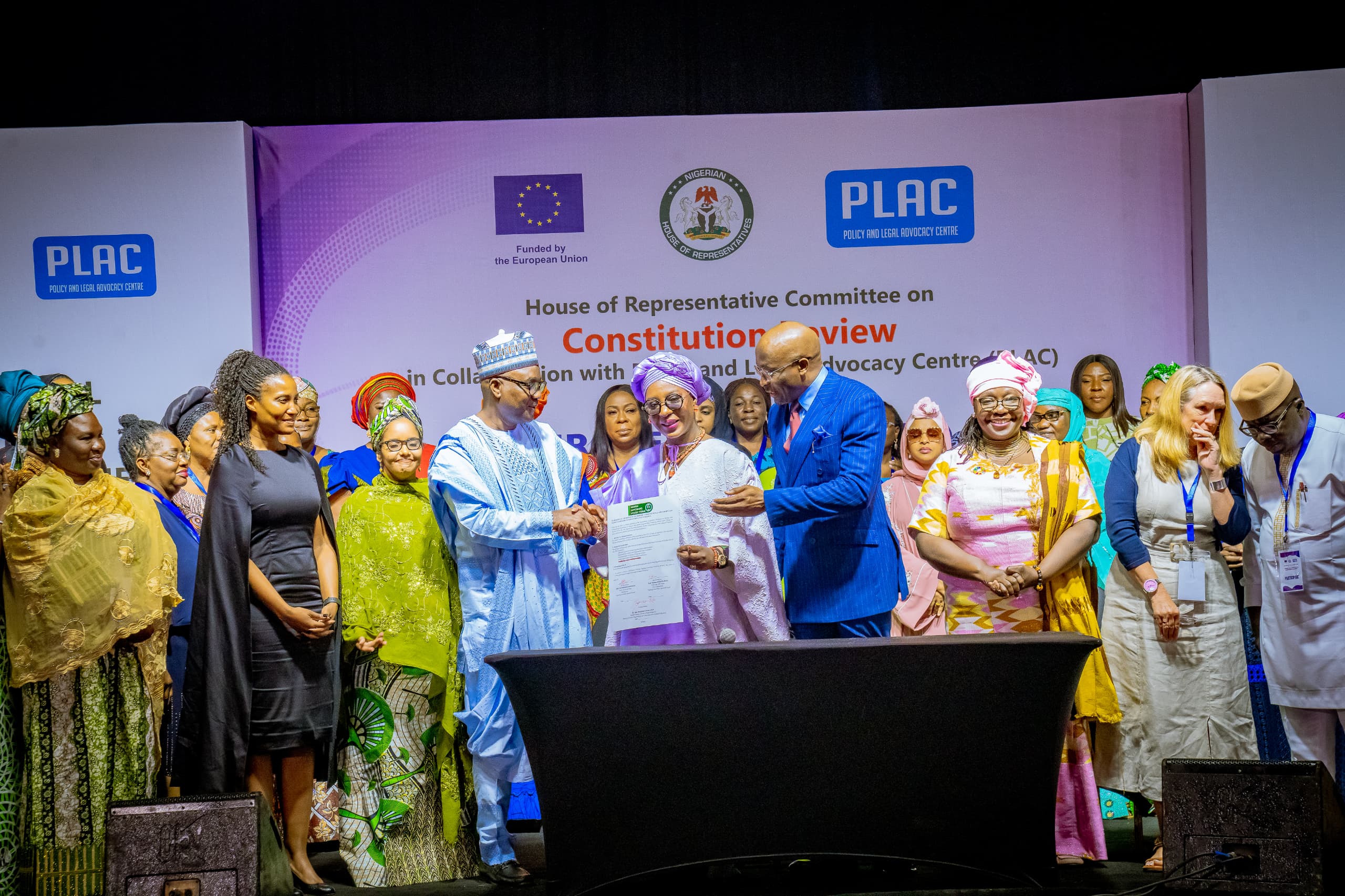News
Constitution Review: Women Empowerment Necessary, Strategic For Economic Growth – Speaker Abbas

News
Infrastructure: Kalu Builds New Classrooms, Roads, Boreholes In Bende Communities+PHOTOS

By Gloria Ikibah
Communities in Bende Federal Constituency, Abia State, are beginning to see visible signs of change as Deputy Speaker of the House of Representatives, Rep. Benjamin Kalu recently launched a series of public infrastructure projects.
The initiative, which began on Friday, took Kalu across three key wards Bende, Itumbauzo, and Uzuakoli, where he formally opened a number of completed facilities. These include blocks of classrooms, administrative offices, rehabilitated roads, and new boreholes.

Bende Constituency, one of the largest in the country with 13 wards, has long grappled with infrastructure gaps. The newly delivered projects are seen as part of a broader effort to close those gaps and raise the standard of living in the area.
Residents say the projects are already making a difference in both school attendance and ease of movement between villages. Many hope this momentum continues in the months ahead.


News
Deputy Speaker Leads Defection of PDP Stalwart Chris Igwe, 13,000 Followers to APC In Abia

News
Speaker Abbas Raises Alarm on Workplace Safety in Nigeria

…as labour minister call for stricter laws to protect workers
By Gloria Ikibah
Speaker of the House of Representatives, Rep. Abbas Tajudeen, has expressed serious concern over the state of workplace safety in Nigeria, calling for urgent legislative action to prevent further injuries and fatalities.
Speaker Abbas made the call during the 2025 World Day for Safety Conference, with the theme: “The Legislative Perspective: Safety First – Building a Safer Future for All Nigerians”, organised by the House Committee on Safety Standards and Regulations at the National Assembly complex on Tuesday.
The Speaker who was represented by Ondo lawmaker, Rep. Oluwatimehin Adelegbe, said that the occasion was a reminder of the need to protect Nigerian workers from occupational hazards.
He said: “Today’s event is very significant, especially in the lives of workers across the globe. It reminds us of the need to guarantee the safety of workers against occupational hazards and fatalities.
“In societies where life is not given the right premium, workers are exposed to various accidents and dangers. Every worker has a right to be protected.”
Speaker Abbas acknowledged the global importance of the World Day for Safety, which was launched in 2003 by the International Labour Organization (ILO), and shared alarming statistics. “About 2.3 million workers lose their lives every year from workplace injuries and health hazards, with about 160 million non-fatal injuries,” he noted.
Abbas lamented the lack of reliable data In Nigeria, and said the most recent figures—238 deaths and 3,461 injuries in the construction industry—date back to between 2014 and 2016. “Even those reports are incomplete,” he added.
He also cited a study at the Federal Medical Centre in Asaba, which found that 52.7 percent of health workers surveyed had experienced needle pricks, while 53.3 percent reported incidents of blood splashes, and linked this to greater risks during outbreaks like Ebola and COVID-19, recalling the sacrifices of Dr. Ameyo Adadevoh and Nurse Justina Ejelonu, who died after coming in contact with the index Ebola case in 2014.
The Speaker blamed many of the injuries in construction sites and criticised the neglect of safety in public buildings.
“Unsafe acts and unsafe working conditions, including lack of personal protective equipment (PPE), hoisting gear, appropriate scaffolds and ladder protection.
“Most public buildings and workplaces in Nigeria are design-built and opened for use without safety checks. Apart from fire extinguishers, you hardly see buildings marked with reflective signs that guide workers in emergencies”, he lamented.
Abbas promised that the House would review and streamline existing laws to improve enforcement and public health protections.
“As the law-making body, the House of Representatives is poised to cause the necessary review of existing laws and seek ways to make them more effective in safeguarding public health and safety”, he added.
The Chairman Committee on Safety Standards and Regulations, Rep. David Idris Zacharias in his welcome address said the event marked a historic moment in our nation’s journey towards building a safer, more resilient society.
He stressed that safety must be prioritized, embedded in every policy, and included in every planning phase of our national projects. Whether it’s construction, road, workplace, environmental, or food safety, these are not peripheral issues—they are central to our well-being.
According to Zacharias, the committee’s mission is not only to pass laws but to ensure they are implemented effectively.
He acknowledged that enforcement gaps, poor awareness, and weak appreciation of safety still plague the country. However, he added, and that these challenges present us with immense opportunities to innovate, collaborate, and learn from others.
The committee chairman therefore called for partnerships with businesses, labour unions, NGOs, and the public.
He promised stronger enforcement, increased funding, more monitoring, and public awareness campaigns.
“Safety must be everyone’s concern. From the smallest corner shop to the largest industrial complex, we all have a role to play. We envision a future where safety is embedded in every organisation’s culture, every construction project, and every government policy,” he said.
The Minister of Labour and Employment, Dr. Muhammadu Maigari Dingyadi, in his message called for stronger legislation and cooperation among stakeholders to build a safer work environment for all Nigerians.
He also emphasised that while innovation is necessary, it must not come at the cost of workers’ welfare.
He said: “The theme of today’s conference, The Legislative Perspective: Building a Safer Future for All Nigerians, highlights the critical role of legislation in helping to shape a resilient and future-ready occupational safety and health framework.
“Legislation is central to navigating the digital frontier responsibly; ensuring that innovation does not erode the foundational rights, dignity, and welfare of the Nigerian worker.
“The safety of our workers must be anchored on secure technologies, sound data protection, and inclusive policy frameworks that uphold international labour standards”.
Dr. Dingyadi also stressed the importance of collaboration through the tripartite model involving government, employers, and workers’ organizations, to ensure policies are both enforceable and inclusive.
He further acknowledged delays in reviewing labour laws but said progress had been made, and called for unity across all sectors to build a lasting culture of safety.
“Year 2024 marked significant progress with the publication of Nigeria’s revised OSH Country Profile and the Federal Executive Council’s approval of landmark OSH regulations such as the Construction Safety Regulations 2024”, he added.
The Minister also spoke about the Occupational Safety and Health (OSH) Bill, which he said was developed through wide consultations.
“The Ministry has led the development of the Occupational Safety and Health Bill, which has been crafted through our distinctive Tripartite Plus framework. We count on the continued partnership of all stakeholders to make this a reality.
“Together, let us rise to the challenge of building a resilient safety culture, underpinned by innovation, inclusivity, and a shared commitment to protecting the lives of all Nigerian workers”, Dingyadi stated.
-

 News15 hours ago
News15 hours agoCourt dismisses Emefiele’s bid to reclaim forfeited 753 duplex estate
-

 Opinion11 hours ago
Opinion11 hours agoTHOUGHTS ON CONSTITUENTS DEVELOPMENT IN OBIO-AKPOR
-

 News6 hours ago
News6 hours agoJust in: Popular Nigerian billionaire, E-Money nabbed by EFCC
-

 News7 hours ago
News7 hours agoKing Sunny Ade’s family opens up over his whereabouts after daughter’s alarm
-

 Metro15 hours ago
Metro15 hours agoWanted CBEX promoter surrenders to EFCC
-

 Politics15 hours ago
Politics15 hours agoPDP Calls Emergency Session as Top Members Flee to APC
-

 News7 hours ago
News7 hours agoEx-DIG,Olofu debunks online newspaper report, says ” I retired from NPF meritously after 35yrs service
-

 Entertainment16 hours ago
Entertainment16 hours agoCubana Chief Priest responds following reports of being denied entry at Headies Awards






